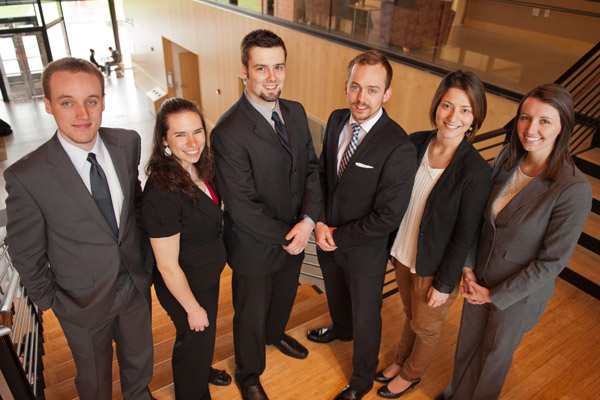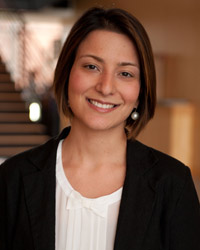
Six business students participated in the 2013 International Collegiate Business Strategy
Competition this spring. From left to right: Zach Grah, Jordan Dahms, Cameron Holcomb,
Arne-Morten Willumsen, Iren Atemad and Karrie Spencer. Photo by John Froschauer.
The Real World (with a Safety Net)
Assistant Professor of Management Kory Brown has a plaque on his office wall commemorating his participation nearly 20 years ago in a business simulation competition. Pointing to it, he said with a smile: “I learned more from that competition than I learned in my MBA program.”
To be sure, Brown’s comment contains some amount of hyperbole. But the value he places on the International Collegiate Business Strategy Competition is clear: it was transformative. So much so, this spring will mark the third year Brown has brought PLU undergraduate business students back to the event – sponsored by Long Beach State University in California – in which he first participated as an MBA student.
For the competition, student teams create a simulated company, develop a product concept and business model for that company, and then run that company – top to bottom – for a simulated 20 consecutive quarters. Brown said virtually every aspect of business is evaluated and measured in the competition. The ICBSC provides students the opportunity to learn and compete with approximately 30 other universities through simulating the running of a company, as well as networking with business leaders and students from around the world.
“Students are stretched in ways no other academic setting can,” Brown said. He calls simulations like these “the real world with a safety net.”
The culmination of this year’s competition will take place April 18-20. But much of the work will be done long prior to that. For about six months, PLU Business students will have been at work making decisions as a corporate executive team. Students selected to participate in the competition need to have basic business skills, but the real keys, according to Brown, are self-motivation, discipline and the ability to collaborate with teammates. All told, each student will spend 300-500 hours preparing for and participating in the competition.
This year, six students are participating in the event. They are Zach Grah, Arne-Morten Willumsen, Karrie Spencer, Jordan Dahms, Iren Atemad and Cameron Holcomb.
“This is just an outstanding opportunity for our students to experience business from the top,” Brown said. “They are now going to walk out of PLU not only with their degree, but an understanding of all dimensions, not just the one they’re trained in.”
Iren Atemad, one of this year’s participants, agrees. “One of the lessons learned in these early stages of the competition is that everything depends on everything else,” she said. “This has made me understand the complexity of the business environment and how a team of executives truly manages a business.”
Finance faculty member Kevin Boeh led the development of the new Master of Science in Finance program. He points to the considerable time both he and Brown spent in the business world. They both stress pragmatism. It informs the way they teach, and it underscores the value they place in putting students in situations that focus on real-world business and finance issues.
“As much as we can simulate reality, then our students will have an edge,” Boeh said. “So the question is: What can we do to simulate reality?”
 “One of the lessons learned in these
“One of the lessons learned in theseearly stages of the competition is that everything depends on everything else. This has made me understand the complexity of the business environment and how a team of executives truly manages a business.”
—Iren Atemad
There are two more student groups that will be participating in competitions this spring: The G.A.M.E (Global Asset Management Education) Forum, and the CFA Institute Research Challenge.
This past spring, Boeh and five members of the Student Investment Club traveled to New York City for the G.A.M.E Forum, founded and organized by PLU alumnus David Sauer ’81, a professor at Quinnipiac University in Hamden, Conn. Dr. Boeh will take another group this spring.
The G.A.M.E Forum, which will take place this year on April 4-6, brings more than 100 university groups to Wall Street, where students interact with industry leaders from hundreds of Wall Street firms – such as Abby Joseph Cohen of Goldman Sachs and Roger Ibbotson of Zebra Capital Management –and learn best practices in investment management.
Part of the event consists of the portfolio challenge, where each school’s team presents in front of professional fund managers. Last spring, the members of PLU’s Student Investment Club presented details of their $145,000 portfolio. The fund was established in 1982 by Mary Lund Davis, whose $25,000 donation has been focused on giving students the opportunity to gain experience in investment management through real-life investing. “We had to present why and how we picked our current stocks, and our underlying strategy. Also we presented our portfolio against benchmarks to showcase our historical performance,” said Arne-Morten Willumsen ’13, one of the 2012 G.A.M.E. participants. His group took third place in the undergraduate growth division, and he’ll be returning with a new team this year.
Along with the presentation, the group was able to participate in discussions and workshops related to investing, account management, and different types of market trading.
The CFA Institute Research Challenge is a global competition in which groups of students worldwide select a small-to-midcap public company like Fischer Communications or Zillow, research it, and present their findings in a 10-page Initiation of Coverage Report.
This year at the regional competition in Seattle held on February 1 – among seven universities – the PLU’s team of five students had 10 minutes to present their report to a panel of industry leaders, and then answer a 10-minute Q-and-A session. The PLU team, advised by visiting professor Olgun Sahin, placed second. The winner of the regional competition will move onto New York City. All told, more than 200 universities worldwide participate in the event.
For Boeh, the value of the CFA Institute Research Challenge is not simply that it presents opportunities for students to research real companies. The Challenge is also an opportunity for students to work with a financial analyst mentor who is currently practicing in the region. “It’s a great networking opportunity for students,” Boeh said, and he’s seen internships come out of it.
“You cannot simulate this exposure in the classroom,” Boeh said. “This experience allows the students to see in action what they learn in the classroom.”
—
Student competitions like these are funded in part by the Dean’s Fund for Excellence. To help support innovative programs like these, click here.
—
This article was first published in the Spring 2013 issue of Business Scene magazine. To see the magazine in its entirety, click here.


